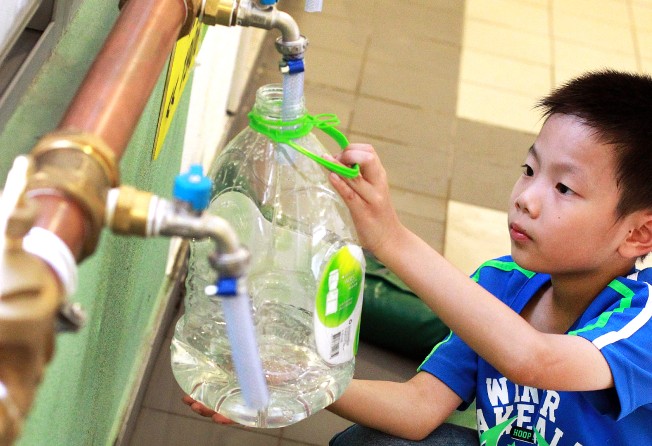Residents of Hong Kong estates hit by lead scare remain sceptical as new pipes provide water from rooftop tanks

The first batch of new pipes in public housing estates hit by the lead-in-water crisis has received mixed reviews, with some residents relieved their daily journey for water has been shortened and others sceptical and continuing to fetch water from other sources.
The new pipes provide a water supply from a rooftop tank to the lift lobby of each floor, meaning residents no longer need to go out to the pipes on the street.
Leung Sau-ling, a pregnant housewife living in Sheung Ching House in Kai Ching Estate, Kowloon City, used water from the new pipes to prepare lunch on Monday afternoon.
Her eight-year-old son Edmond Ng Yat-long carried two 4.5-litre bottles of water from their floor’s corridor back to their flat.
“Dad and I have carried water together every day [since the contamination broke out in early July]. Usually he takes four bottles and I take two,” Ng, who is having his summer holidays, told the Post.
“Last night we used the new pipes for the first time – it’s much more convenient.”
The temporary pipes, built by the Kai Ching Estate’s main contractor China State Construction Engineering, started operation on Sunday and will run from 7am to 9pm every day.
Leung, who had her blood tested in late July – being pregnant, she is one of the three vulnerable groups who qualify for the weekly government-run blood tests – was thankful she was not among those with high lead levels in her blood.
She felt that the water from new pipes are clean enough for washing vegetables but would continue to use bottled water for cooking.
“I’m most worried about my daughter, she’s seven months now” said Leung, gesturing at her protruding belly. “These taps [in the corridor] are temporary; I just hope the government will change our water pipes soon. I also don’t know when the water filters will be installed as promised.”
Koo Tung-hung, mother to a six-year-old son and two-year-old daughter also living in Sheung Ching House, continued to fetch water from the street pipes downstairs as she did not trust the quality of water from new taps on her floor.
“There were a lot of white particles, like washing detergent,” Koo said, referring to the water she took from the new taps on Sunday night.
“I dare not use the water from those pipes, using the street pipes feels safer.”
As Koo’s family needs at least 10 bottles of water every day, she fetches water three times daily, sometimes bringing her young children with her.
“It’s less convenient but I’d rather wait and see first; so far none of my neighbours have used those [new] taps today,” she said.
Regarding the complaint about white particles in water from the new pipes, the Water Supplies Department said it was investigating the issue.
However, an academic said residents need not worry as the white particles were small water bubbles, not chemicals.
“Such water bubbles are formed when the water pressure is too high or when pipes are too narrow,” said Professor Ho Kin-chung, dean of Open University’s school of science and technology. “Scientifically speaking, there’s nothing to fear.”
Meanwhile, a Housing Authority review committee held its third meeting on Monday. Chairman Cheung Tat-tong said new measures would be implemented immediately to ensure soldering materials were inspected.